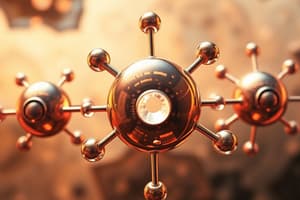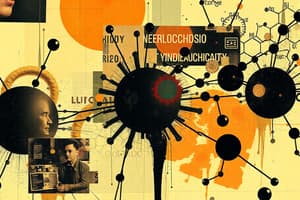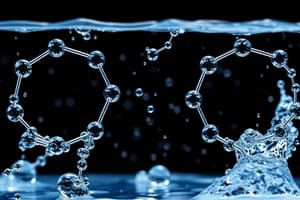Podcast
Questions and Answers
What is the key factor that determines whether a molecule is polar or non-polar?
What is the key factor that determines whether a molecule is polar or non-polar?
- The electronegativity difference between the atoms
- The number of bonds in the central atom
- The symmetry of the molecular structure (correct)
- The presence of unshared electron pairs
What is the range of electronegativity difference values for polar molecules?
What is the range of electronegativity difference values for polar molecules?
- 0 - 0.4
- There is no specific range
- 0.5 - 1.9 (correct)
- 2.0 - 3.5
Which of the following statements is true for non-polar molecules?
Which of the following statements is true for non-polar molecules?
- Their dipole moments are asymmetrical
- The bonds on the central atom involve different atoms
- They have unshared electron pairs
- Their dipole moments cancel out due to symmetry (correct)
What is the purpose of the electronegativity value?
What is the purpose of the electronegativity value?
What is the quantitative measure of the polarity of a bond called?
What is the quantitative measure of the polarity of a bond called?
Which type of catalyst is used in the decomposition of hydrogen peroxide?
Which type of catalyst is used in the decomposition of hydrogen peroxide?
What is the catalyst used in the nitration of benzene with concentrated sulfuric acid?
What is the catalyst used in the nitration of benzene with concentrated sulfuric acid?
In which chemical process is iron used as a catalyst for its reaction?
In which chemical process is iron used as a catalyst for its reaction?
Which catalyst is utilized in the hydrogenation of a C=C double bond?
Which catalyst is utilized in the hydrogenation of a C=C double bond?
What type of catalyst is employed in the manufacture of ammonia by the Haber Process?
What type of catalyst is employed in the manufacture of ammonia by the Haber Process?
According to collision theory, which of the following factors does NOT directly influence the rate of a chemical reaction?
According to collision theory, which of the following factors does NOT directly influence the rate of a chemical reaction?
If the concentration of a reactant is doubled, how will the rate of the reaction be affected, assuming all other factors remain constant?
If the concentration of a reactant is doubled, how will the rate of the reaction be affected, assuming all other factors remain constant?
If the temperature of a reaction is increased, which of the following statements best explains the effect on the reaction rate?
If the temperature of a reaction is increased, which of the following statements best explains the effect on the reaction rate?
For a solid reactant, which of the following changes would result in the greatest increase in reaction rate?
For a solid reactant, which of the following changes would result in the greatest increase in reaction rate?
A catalyst is added to a reaction. Which of the following statements best describes the role of the catalyst?
A catalyst is added to a reaction. Which of the following statements best describes the role of the catalyst?
Flashcards are hidden until you start studying




